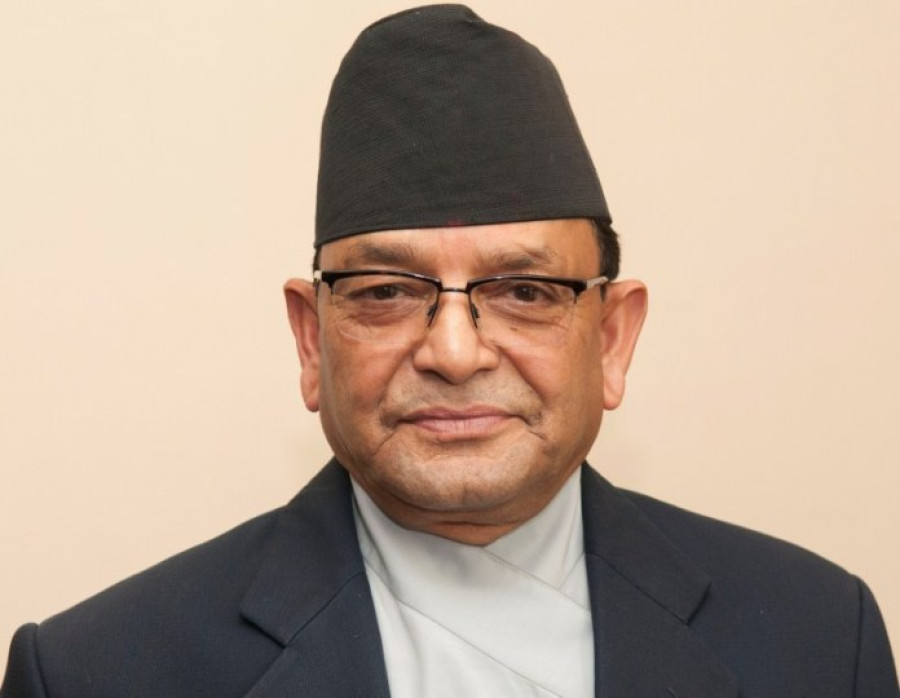National
Former anti-graft body chief abruptly suspended investigations into a dozen lawmakers and government officials, records show
Deep Basnyat, who headed the Commission for Investigation of Abuse of Authority between 2016 and 2018, is being probed for money laundering.
Prithvi Man Shrestha
Two years ago, in the middle of an investigation into Nepali Congress lawmaker Mohamad Aftab Alam, the Commission for Investigation of Abuse of Authority abruptly suspended the probe, saying there wasn’t enough evidence against him.
The man in charge of the investigation was Deep Basnyat, then chief of the anti-corruption body. Basnyat himself is now under investigation—and has his assets frozen—by the Department of Money Laundering Investigation for allegedly transferring money to foreign countries. The CIAA is also investigating into the property Basnyat earned during his government service, and his involvement in transferring the land at Lalita Niwas to fake tenants.
In recent weeks, questions have been raised over Basnyat’s motivations, during his tenure as acting chief and chief of the anti-graft body between October 2016 and May 2018, in suspending nearly a dozen investigations into lawmakers and government officials suspected of corruption. In addition to Alam, some notable names of officials who were under investigation—but later suspended under Basnyat’s orders—include former minister Chhabiraj Pant, lawmakers Ichchharaj Tamang, Umesh Shrestha, Janardan Dhakal, and Baburam Pokhrel.
According to documents received by the Post, Basnyat also dropped investigations into the property owned by former water supply ministry secretary Gajendra Thakur, former government secretary Shanta Bahadur Shrestha, former Nepal Police chief Upendra Kanta Aryal, former Armed Police Force chief Jeevan Kumar Thapa, and former vice-chancellor of Tribhuvan University Hira Bahadur Maharjan.
In interviews with the Post, officials at the commission said the investigations were suspended in the lack of adequate evidence against them. Investigations into some of the government officials were dropped, according to CIAA officials, because the probes were motivated by personal vendetta of former anti-graft body chief Lokman Singh Karki.
“Suspending investigation, by and large, means closing the case,” a senior official at the commission told the Post. “Only if substantial new evidence is available, the suspended cases can be reopened.” The official requested anonymity because he wanted to speak openly about the issue.
Besides investigations into the property of several lawmakers and officials, Basnyat had also halted a probe into the decision by the central bank to allow Ncell, a private telecom operator, to repatriate its dividend.
Between August and September 2016, Nepal Rastra Bank allowed Ncell to repatriate dividend worth Rs8.36 billion, going against the decision of then parliamentary Finance Committee.
The commission, in November 2017, decided not to pursue a probe into the case, arguing that the central bank’s decision had followed due legal procedure while the Large Taxpayers’ Office also determined the revised tax amount to be paid from the Ncell buyout deal.
One official involved in the probe against Basnyat who also agreed to speak only on condition of anonymity said the anti-graft body has been receiving several complaints against Basnyat ever since the anti-money laundering body initiated a probe into his assets.
“We have received complaints of Basnyat taking bribes from some people by asking his own men to register a fake complaint during his tenure at the commission,” the official said.
As an ongoing investigation has concluded that Basnyat amassed huge property and tried to hide his gains, the department official said that the case against him would be filed right after the commission files the case on Lalita Niwas scandal, where Basnyat is likely to be one of the defendants.
The Post made multiple attempts to seek comments from Basnyat for two days, but was unable to reach him.
Among those whose cases were closed, Congress lawmaker Alam is currently is in the limelight after a 12-year-old murder case was reopened last month.
Police have registered a case against Alam at Rautahat District Court on charges of attempted murder and holding and transporting explosive materials. He is also facing charges of burning injured people alive in brick kilns to destroy evidence after an alleged blast in Fardahawa, Rajpur, in 2008.
Citing his gangster-like working style, the Department of Money Laundering Investigation has now launched a new investigation into Alam.
“We are in the process of collecting evidence against him,” said Roop Narayan Bhattarai, director general at the department.
Among the ex-lawmakers, Tamang and Umesh Shrestha, who represented the erstwhile CPN-UML and the Nepali Congress respectively in the previous parliament, were accused of influencing fellow lawmakers to draft bills to benefit themselves while introducing the Banks and Financial Institution Act and Education Act, as both had personal interests.
Tamang is the chairman of Civil Bank and Shrestha is the owner of Little Angels School and ex-board chairman of Prime Bank.
Tamang, who is also a real estate developer and promoter of Civil Cooperative, is accused of plunging the Civil Cooperative into a crisis by providing most of the loans to his own firms and not taking repayment, according to the Department of Cooperatives which regulates the cooperatives.
Thakur was recently embroiled in a controversy after the Italy-based Cooperativa Muratori e Cementisti di Ravenna (CMC), ex-contractor of Melamchi Water Supply Project, in March, alleged him along with the immediate executive director of Melamchi Water Supply Board Surya Raj Kadel, of seeking cuts to allow it to continue working in the project. Both officials have denied the accusation.




 18.12°C Kathmandu
18.12°C Kathmandu














